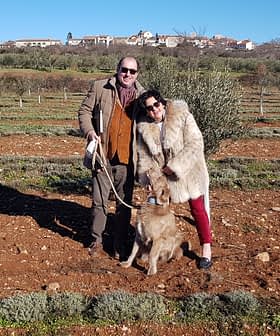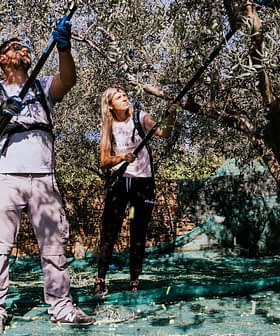After submitting 92 entries, Croatian olive growers eagerly await the 2024 NYIOOC World Olive Oil Competition results.
On the first day of the competition, 40 winners were announced. Two Croatians were among them, with OPG Celini and OPG Ante Vulin each earning Gold Awards for a medium-intensity blend and medium Oblica, respectively.
Farmers and millers in Istria and Dalmatia, the country’s two main producing regions, hope the awards will compensate for a disappointing start to the 2023/24 crop year.
See Also:The best extra virgin olive oil from CroatiaOlive oil production has fallen by an estimated 30 to 40 percent compared to last year, mainly due to unfavorable climatic conditions. According to International Olive Council data, Croatia produced 5,100 tons of olive oil in 2022/23.
Despite the significant decline, producers are confident they crafted high-quality extra virgin olive oil.
“Whoever sent samples of his oil can hope for good results,” said multiple award-winning Tomislav Duvnjak from Vodice in Dalmatia.
Since Duvnjak launched a coordinated effort to organize and help finance small Dalmatian producers to send entries to New York in 2021, Croatia has consistently been one of the biggest winners at the World Competition.
In 2023, Croatian producers earned 105 awards from 131 entries. Only Italy and Spain earned more awards. Similar situations plaid out in 2022 and 2021, with Croatians earning the third-most (96) and fourth-most (87) awards, respectively.
Before Duvnjak’s initiative, Croatian producers earned between 20 and 50 awards yearly.
He also pointed out that Croatia consistently has one of the highest success rates, reaching or exceeding 80 percent in the last three years, including a tally of 90 percent in 2022.
Ivica Vlatković, an award-winning producer and vocal advocate for the Croatian olive oil sector, believes the small country home to slightly less than four million people will soon be synonymous with quality.
He cites a long-standing tradition of olive growing and olive oil production, many autochthonous varieties – including Oblica, Levantinka, Istrian Bjelica, Istrian Buza and Krvavica olives – as one of the reasons for the country’s rising international profile.
Vlatković has also seen the trend of increasing demand for organic olive oil and believes Croatia has great potential for organic production. He said there are 1,956 hectares of organic olive groves in Croatia, nearly three times the number of organic olive groves in the United States.
However, Croatians point out that high-quality organic production comes at a cost, with Croatian extra virgin olive oils retailing for up to 30 percent more than the European average.
Srećko Gross, a pharmacist and the president of the Zagreb Olive Institute, a farmers’ association in the capital, attributed these high prices to the elevated production costs associated with organic farming.
However, he warned that high prices had led to an uptick in olive oil adulteration and fraud, which data from local authorities confirm.
In one of the most recent controls, 13 out of 25 randomly selected samples labeled extra virgin failed to meet the grade.
One of the seven Croatian brands selected failed the inspection, along with five of nine Italian-branded oils and seven of nine Spanish brands.
Gross highlighted the role of the NYIOOC in promoting small-scale farmers who concentrate on quality over quantity instead of white-label brands that sell cheaper blends of virgin or extra virgin olive oil blended with olive pomace oil, some of which are mislabeled.
“There are no refineries here… such brands should be excluded from the game,” Gross said. “We, as a small country, should continue to develop the production of top-quality extra virgin olive oils, for which we are increasingly known all over the world.”









